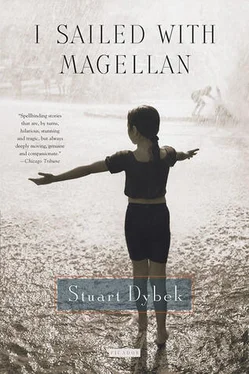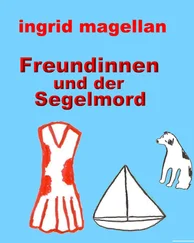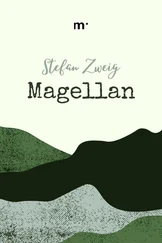Out on the street, sirens wail as if every cop, ambulance, and fire truck in Little Village is rushing past. The lengthening ash of Joe’s cigarette tumbles to the bar. Joe spits out the butt, and it rolls across the bar top onto the floor, where Zip grinds it out. Their arms have begun trembling in time to each other, but neither budges. Teo turns his face from Joe and finds himself looking into the mirror. A man in a blue mask looks back reproachfully; he won’t allow another defeat. Teo closes his eyes and concentrates on breathing, resolved to ignore the pain, to welcome it, and to endure until Joe tires and he makes one last, desperate move. Teo knows that final assault will be a sign of weakness; if he can hold it off, he’ll win.
“From the land of sky blue waters” tom-toms from the TV, and Joe’s left hand slowly snakes across the bar to Teo’s tank top. At its touch, Teo pushes back harder, but Joe won’t give. His right arm resists Teo’s concentrated force while his left hand gently brushes, then fondles Teo’s chest.
“Got you where I want you now,” Joe says. “Cootchie-cootchie-coo, motherfucker.”
Our father figured that we’d want to see the sewer rat he’d captured, and he was right about that, so he waited to kill it until Mick and I came home. It was a Saturday in summer, and I’d taken Mick to the icy swimming pool at Harrison High. Our hair, towels, and the wet swimsuits we wore beneath our jeans still smelled of chlorine as we walked down the gangway into the sunny backyard where Sir had an enormous rat imprisoned in a glass canister. It had a wide-angled mouth and metal lid, the kind of rounded jar that’s often used for storing flour or sugar. The rat filled it up and behind the thick convex glass appeared distorted and even larger, with magnified beady eyes, buck teeth, handlike rodent feet, and a scaly bald tail. I looked for rabies foam around its whiskers. Sir had used the canister to store dago bombs. Every few weeks, he’d lift the sewer cover over the pipe in the basement, light a dago bomb, and drop it down the sewer. The echoey sewer amplified the explosion. Sir said the noise chased off rats. The fireworks from the canister were gone; I’d been planning to pilfer a few for Fourth of July, but I never saw them again. I don’t know what Sir did with them, or how he managed to catch the rat in the jar. I didn’t ask at the time, maybe because we were too involved with preparations for its execution.
My father had me take the garden hose and fill the large galvanized metal washtub that he always referred to in Polish as the balja. We used the balja for mixing cement and, sometimes, for rinsing the mud out of crayfish we caught with string and chicken livers at the Douglas Park lagoon. When the balja was brim full, Sir brought over the rat-in-a-jar, as we’d begun to call it. I stood on one side of the tub and Mick on the other. Mick had stripped down to his bathing suit and cowboy boots as if he planned a dip in the balja himself. He’d put on his cowboy hat and was holding his favorite toy, a cork-shooting shotgun. Mick’s toy box was an arsenal: matched six-shooters that shot caps, a Davy Crockett musket to go with a coonskin cap, squirt guns of various calibers, pirate swords and flintlock pistols, a Buck Rogers ray gun. They were mostly made of plastic, but not the shotgun. It had a blued metal barrel and a wooden stock, and broke at the center like a real shotgun. Breaking it was how one pumped it up enough to shoot the corks that came with it. If you jammed the muzzle into the dirt after a rain, it would shoot clots of mud. Holding the rat-in-a-jar with one hand on the bottom and the other on the lid, Sir lowered it into the balja. The rat looked worried. When the glass canister was entirely immersed, Sir slowly raised the metal lid so that water could seep in. Mick and I moved in closer on either side of him, trying to see. Sir lifted the lid a little more, and the rat shot straight up out of the tub and splashed back down into the water. Mick and I jumped back, but Sir grabbed the shotgun by the barrel out of Mick’s hand, and as the wet rat scrambled over the side of the washtub, Sir knocked it back into the water. “Da-dammit!” Sir yelled. He was thwacking at the balja, sending up swooshes of water, and the rat squirted out between blows and ran for the homemade board fence separating our yard from the woodpiles and uncooped chickens in Kashka’s yard next door. We scrambled after it, and Sir managed to hack the rat one more time as it squeezed through the fence and crawled off into a woodpile.
We stood peering through the fence.
“Da-damn,” Sir muttered.
“My gun!” Mick said. Sir handed it back to him. “You ruined my gun.” A piece of the wooden stock had splintered off, and the connection between the barrel and stock was noticeably loose. One more good whack would have snapped it in two.
“Is that rat blood?” I said. There was a red, sticky smear along the side of the stock.
“I nailed it a couple good ones,” Sir said.
Mick dropped the shotgun as if it might be carrying rabies and walked away, fighting back tears.
For a week or so the shotgun lay in the back yard where Mick dropped it, rusting in rain, bleaching in sun. Finally, Mick forgave our father enough to pick up the gun again. The bloodstain was now a permanent feature of the splintered stock, and though the gun was the worse for wear, it had acquired a mystique it hadn’t had before its baptism in rat blood. It became Mick’s favorite toy all over again, the weapon he’d always take with him when he went down the alley to play guns with his best friend, JJ — short for Johnny Junior.
Johnny Senior was Johnny Sovereign.
When Johnny Sovereign was found dead in his own car, with a jockstrap on his face and his balls blown off, it was big news in the neighborhood, but Mick knew nothing about the specifics. My parents and I never discussed the murder openly at home. Mick had simply been told that it wasn’t a good time to go play at his friend JJ’s house, that he should wait until JJ called him. But Mick got bored waiting, so after a few days he decided to sneak over to JJ’s for a visit. He pulled on his cowboy boots, armed himself with the rat-blood shotgun, and snuck off down the alley. Alleys were secret thoroughfares for kids, and as long as Mick was sneaking away from our house, he decided he’d also sneak up on JJ. Surprise attack was one of their favorite games. He went past the garage where JJ’s father parked the yellow car, but the garage was empty. As always, pigeons hooted from inside. At the Sovereigns’ back fence, overgrown with morning glories and sizzling with bees, Mick paused, as he and JJ often did, to poke a finger inside a morning glory. He and JJ would pretend the flower was a socket, but unlike an electric socket, a morning glory was safe to stick your finger into. If you held it there long enough, you’d feel connected to the power coming through the tangled green wires of the vines.
Recharged with morning-glory power, Mick snuck past the back fence into the small patch of grassless back yard that led into a shadowy gangway. Instead of going to the back door, he sidled along the house, crouching under the back windows. He’d approached this way several times before to ambush JJ. He liked to catch JJ when he was least expecting it — still in his pajamas, eating Sugar Pops at the breakfast table.
The curtained kitchen window was partially opened, and Mick slowly rose and slid the barrel of the shotgun through the slit between the drawn curtains. He was into the make-believe of the game, and his heart pounded with a combination of tension and repressed laughter. When he heard the scream, he froze.
“Oh, God, no, please, please, I beg you,” a woman’s voice cried. “I don’t know anything about what Johnny did. Please, I won’t say anything. I have two little kids.” It was JJ’s mother, Vi, who’d always been nice to Mick. She was weeping hysterically, repeating, “Please, please, I wouldn’t recognize your voice, you never called, I don’t know who you are, it was all Johnny, for the love of Jesus, I’m begging you don’t, please, I’m still young.”
Читать дальше












